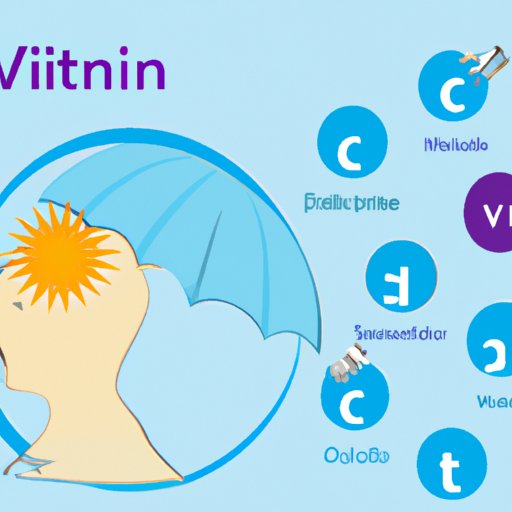Introduction
Hair loss is a common problem that affects millions of people around the world. It can be caused by a variety of factors, including genetics, aging, stress, or medical conditions. Recently, there has been an increased focus on the potential link between hair loss and vitamin D deficiency.
Vitamin D is an essential nutrient that plays a key role in many body functions, including bone health and immunity. It is usually obtained through exposure to sunlight and certain foods. A vitamin D deficiency occurs when the body does not have enough vitamin D to meet its needs.

Examining the Link between Vitamin D Deficiency and Hair Loss
Although there is no scientific consensus on the exact connection between vitamin D deficiency and hair loss, some research suggests that there may be a correlation. One study found that people with lower levels of vitamin D were more likely to experience hair loss than those with higher levels of the nutrient.
The exact mechanism by which vitamin D deficiency might cause hair loss is still unclear. However, some experts believe that the lack of the vitamin could interfere with the body’s ability to produce and maintain healthy hair follicles. Additionally, it is believed that vitamin D deficiency may disrupt the normal functioning of the immune system, leading to hair loss.

Exploring the Role of Vitamin D in Hair Loss Prevention
Although there is no definitive proof that vitamin D can prevent or reverse hair loss, there is some evidence that it may play a role in helping to keep hair healthy. Vitamin D helps the body absorb calcium, which is necessary for strong, healthy hair follicles. Additionally, vitamin D helps regulate the production of oil in the scalp, which can help reduce dryness and promote healthy hair growth.
The recommended daily intake of vitamin D is 600 IU (International Units) for adults aged 19 to 70 years old. However, some experts suggest that taking up to 1000 IU of vitamin D per day may be beneficial for hair health.
Addressing the Common Misconception about Vitamin D and Hair Loss
It is important to understand that vitamin D deficiency does not directly cause hair loss. While there is evidence that vitamin D may play a role in hair health, it does not guarantee that supplementing with the nutrient will prevent or reverse hair loss. In fact, taking too much vitamin D can be dangerous and can lead to other health problems.
It is also important to recognize that vitamin D is not responsible for growing new hair. The vitamin may help stimulate existing hair follicles, but it cannot create new ones. Therefore, if someone has experienced significant hair loss due to genetics or medical conditions, supplementing with vitamin D may not be effective.

Understanding the Connection between Vitamin D Deficiency and Alopecia
Alopecia is a type of hair loss that occurs when the immune system mistakenly attacks the hair follicles. This can lead to hair thinning or bald patches. There is evidence that vitamin D deficiency may increase the risk of developing alopecia. One study found that people with alopecia areata had significantly lower levels of vitamin D compared to people without the condition.
Additionally, some studies have suggested that supplementing with vitamin D may improve symptoms of alopecia. However, more research is needed to determine if this is true. Until then, it is important to speak to a doctor before attempting to treat alopecia with vitamin D supplements.
Investigating the Relationship between Vitamin D and Hair Loss
If you are experiencing hair loss, it is important to speak to your doctor to determine the cause. Your doctor may recommend blood tests to check for vitamin D deficiency. If your levels are low, they may recommend taking a supplement to restore them to normal.
In addition to supplementing with vitamin D, there are other steps you can take to try to prevent hair loss. Eating a balanced diet, getting regular exercise, and reducing stress can all help promote healthy hair growth. Additionally, using gentle hair care products and avoiding harsh chemical treatments can help minimize damage to the hair follicles.
Conclusion
Vitamin D deficiency is linked to a variety of health issues, including hair loss. Research suggests that vitamin D deficiency may contribute to hair loss, although the exact mechanism is still unclear. Additionally, there is some evidence that supplementing with vitamin D may help improve symptoms of alopecia.
It is important to remember that vitamin D alone is not enough to prevent or reverse hair loss. Eating a healthy diet, exercising regularly, and reducing stress can all help promote healthy hair growth. Additionally, talking to your doctor about any underlying health conditions or vitamin deficiencies can help you identify possible causes of hair loss.


